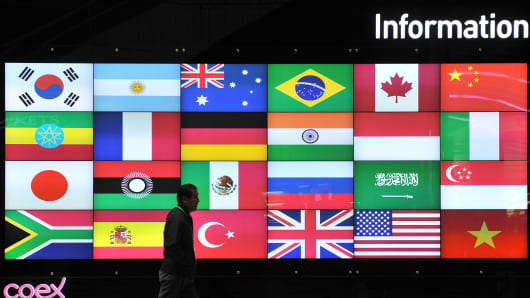The world's top economic policymakers are likely to discuss how Japan's new monetary and fiscal policy drive is weakening the yen when they meet next month, but will stop well short of calling it a competitive devaluation, G20 officials said.
Finance ministers and central bank heads from the G20 group of the world's biggest advanced and developing economies gather on Feb. 15-16 in Moscow, under Russia's 2013 presidency.
With the United States, Britain, the European Central Bank and Japan all resorting to unconventional monetary levers to revive their economies, the spillover of such policies and their exchange rate effects will certainly be on the agenda.
(Read More: Japan Defends Stimulus, Yen Policy Under Fire)
"When countries with reserve currencies try to stabilise their economies through monetary policy, it may lead to currency wars," Ksenia Yudayeva, Russia's envoy to the G20 told Reuters.
"It has been discussed a lot already in the G20 and so far there is no solution. And I think it needs additional discussion," she said on Jan. 17..
The Bank of Japan announced last week, in its most determined effort yet to end years of economic stagnation and deflation, that it would buy unlimited amounts of assets in 2014 and double its inflation target to 2 percent.
This has accelerated a fall in the value of the yen and criticism from a host of policymakers including German Chancellor Angela Merkel, who said central bank policy was not to compensate for lack of competitiveness.
South Korea's central bank governor Kim Chong-soo, whose country is Japan's third biggest export market, told Reuters the Bank of Japan decision created problems. "One is that the level (of the currency) is affected, and the pace of change is also a problem. They did it too hastily."
But at the G20, Japan is unlikely to be singled out.
"Japan is certainly not in the spotlight," said one G20 official involved in preparing for the Moscow meeting. "You cannot argue that Japan is pursuing competitive devaluation."
Yen Fall
The yen has slumped 11 percent against the dollar since early November as Japanese Prime Minister Shinzo Abe stormed to an election victory with bold promises to end decades of stagnation.
As newly minted cash pours into emerging economies in search of higher yields, either their currencies appreciate, making their exports less competitive, or they have to cut interest rates and/or intervene to hold down their currencies.
Too low interest rates can fuel credit and asset price booms that sow the seeds of inflation.
Bank of England Governor Mervyn King, approaching the end of his tenure, warned late last year that too many countries were trying to weaken their currencies in a way that could create problems in 2013.
But the G20 official said the yen fall could also be seen as a result of its overvaluation in 2012, when investors sought alternatives to the euro because of concern about the future of the European single currency area.
(Read More: Further Yen Weakness Unlikely: Japan's 'Mr Yen')
Now that confidence in the euro was returning, money was flowing back out of the yen and into to Europe.
"As long as there is no intervention, this is just markets anticipating policy on the basis of declarations," the G20 official said. "But there will be attention to what is going on in Japan, some discussion and requests for clarifications."
One thing that financial leaders are likely to debate is a statement last Thursday from Japan's deputy economy minister, Yasutoshi Nishimura, that the yen's decline was not over and that a dollar/yen level of 100 would not be a concern.
"There is likely to be a discussion if it is wise to suggest that," the G20 official said.
Study of Spillovers
The G20 has commissioned a study from the International Monetary Fund, the Bank for International Settlements and the United Nations Conference on Trade and Development (UNCTAD) on the ripple effect of money-printing policies.
"Emerging market economies say that quantitative easing and unconventional measures by the U.S., Britain, Japan and the ECB have significant spillover effects on capital flows and commodity prices, which is hotly contested by the U.S. and the ECB," the G20 official said.
"We are ready to carry out an analysis of the spillovers, but if you look at the analysis that the IMF has already done on this issue, they say there is no strong evidence for arguing quantitative easing has had a strong impact on the volatility of capital flows as well as on commodity prices," he said.
G20 financial leaders are therefore likely to leave unchanged their position on exchange rates from the last communique on November 5 in Mexico, the G20 official said.
The overall message from the Moscow meeting is likely to be one of very cautious optimism.
"The main message will be that since last time we met (in Mexico), the tail risks to the global economy have abated significantly ... but there is weakness both in advanced and emerging economies and therefore we are looking at whether additional actions are needed and that we pledge to coordinate polices," one G20 official said.
The downside risks have diminished because the United States steered around its "fiscal cliff" of tax rises and spending cuts, at least temporarily, while the risk of a breakup of euro zone has evaporated together with concerns over a sharp economic slowdown in China, the world's second biggest economy, the official said.


